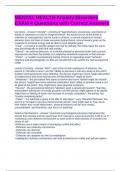MENTAL HEALTH Anxiety Disorders
EXAM 4 Questions with Correct Answers
key terms - Answer-*Anxiety* - a feeling of *apprehension, uneasiness, uncertainty or
dread, in response to a real or imagined threat*. the actual source of the threat is
unknown or unrecognized, can be acute or chronic. a normal response to human
behavior does not have to make everyone dysfunctional. normal anxiety gives us the
response to increase energy and be able to work towards goals
*Fear* - a reaction to specific danger that can be defined, the body reacts the same
way physiologically to both fear and anxiety.
*Stress* - an external pressure, or a mental physical or personal strain that a person
experiences and then the anxiety is a subjective emotional response to that stressor.
*Panic* - a *sudden overwhelming feeling of terror or impending doom* behavior
cognitive and physiologically s/s that are considered to be outside the normal expected
range
Levels of Anxiety - Answer-*Mild* - part of the normal experience of behavior, the
person is *still able to learn* and the *ability to perceive is still very sharp at this point*,
problem solving becomes more effective. the person might have some *slight discomfort
or restlessness and some mild tension reliving behavior* might be seen
*Moderate* - the perceptual field starts to narrow and some *details might be missed*,
the person *might have some selective inattention* their* ability to problem solve is not
as good at this point*, they might have some physical symptoms
*Severe* - the perceptional field and *attention span is greatly decreased*, *learning
and problem solving are not really possible* and the person might appear to be dazed,
might have a *feeling of doom and increase in somatic complaints*, the person has
*trouble completing tasks*
*Panic* - *no teaching is going to be able to take place*, very *disturbed behavior* the
person is *not able to process environmental stimuli*, they might start to *lose touch
with reality* and *could hallucinate*, physical behavior can be very *erratic,
uncoordinated, and impulsive, cant focus on anything*
Defense Mechanisms - Answer-*automatic psychological processes that protect the
person from anxiety and the awareness form internal or external stressors TABLE 14-7*
-everybody uses defense mechanisms at some point to lower anxiety or to protect the
sense of self
-Defenses are a major means of managing conflict and affect
-Defenses are relatively unconscious
-Defenses are discrete
-Defenses are reversible
-Defenses are adaptive as well as maladaptive
-maladaptive defense mechanisms can lead to distortion in reality and self perception
, Panic Disorder - Answer-*Recurrent, unexpected, sudden panic attacks usually only last
a few minutes, but can last a long time*
-age of onset late 20s, strong genetic link, family members are more at risk,
-when a person has a panic attack they *experience physical symptoms of sympathetic
nervous system arousal (fight or flight)* palpitations, tachycardia, sweating, trembling,
SOB, choking sensation, chest pain, nausea, light headiness, dizziness, might describe
having a heart attack, tingling sensations, feel like they are going to lose control or like
they will die, hot flashes or chills, *feelings of depersonalization or derealization*
-*Intense feeling of apprehension, fear, or terror, very limited perceptual field and severe
personality disorganization*
-Often associated with fears of impending doom
-Accompanied by intense physical discomfort
-have to have four or more of these symptoms present to call it a panic attack, *to be
diagnosed with a panic disorder the person have to experience recurrent unexpected
panic attacks and at least one of the attacks have to be followed by a month or more of
persistent concern about having additional attacks or persistent worry about the attack
or its consequences or a significant change in behavior in relation to the attacks*
-*can also be seen with agoraphobia* to be diagnosed with both of these together the
person has to had attacks that are accompanied with a fear of being in the environment
or situations they cant escape from or that might be embarrassing or might not be able
to get help
*(pp. 463-464)*
Generalized Anxiety Disorder - Answer--*Characterized by the presence of excessive
anxiety or worry persistent or unrealistic, lasting for 6 months or longer.*
-Symptoms can include *poor concentration, muscle tension, feeling "keyed up", sleep
disturbance, and restlessness.*
-have to rule out that the symptoms can be attributed to a medical disorder of substance
abuse.
-symptoms are severe enough to cause clinically significant distress or impairment in
the persons functioning
-the ppl *might avoid activities or procrastinate bc of stress, might need reassurance
from other ppl*
-Chronic related to exacerbations & fluctuations in times of stress, worry about things
that might happen or things that will never happen
-have excessive anxiety and worry about a number events or activities, work or school
performance and have a hard time controlling their anxiety, always have to worry about
something
-the anxiety and worry *can be associated with restlessness and describe a feeling of
being very keyed up or on edge, tire easily and have trouble concentrating, might even
complain of their mind going blank, irritability, muscle tension, or sleep disorders*
*(pg. 464)*
treatment for ppl with panic or GAD - Answer-- *aimed at relieving the panic symptoms,
helping the person take control of their life and helping them to be able to accept the
things that they cant control*




